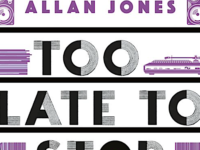Far more interesting than punk, far more satirical than they ever were political, far more important than their relatively brief time on top would ever indicate, the Clash richly deserved just this kind of exploration.
Because they helped define their era, then became hostage to it. Yes, even as The Rise and Fall of the Clash outlines the notable disagreements on the direction of the Clash, and their issues with drugs and with fame, the truth of the matter is they fell because they grew up. And that may be one of the most interesting things of all about the Clash.
Like many of the greatest rock bands, the Clash came together with what Mick Jones calls “a mixture of luck and fortunate timing.” And yet, punk slowly but surely became nothing more than an influence. There was wit, there was emotion, there were great truths. But the Clash, like so many rebels before them, grew past their working-class roots, past their youth, past their moment.
As such, The Rise and Fall of the Clash, due on April 29, 2014 via Shout! Factory, begins with a searing heat bubbling up old photographs of the band. They came in hot, burned ever so brightly, and then they were gone — all within less than a decade.
“We hadn’t really thought about it, when we were going for it — what it would actually be like,” Jones admits now. “We didn’t have any plans … Basically, we were fed up with each other, by that time. So, we we’d have enough, and we’d gotten on our own trips. It wasn’t the same. When we were all together, at the start, we were like: ‘C’mon, guys. We can do this.’ You know, blindly going forward. Then we did do it, and we started to fall apart.”
Manager Bernard Rhodes (like Malcolm McLaren or Brian Epstein before him) was instrumental in helping the band sort out its early image. But Topper Headen, Jones, Paul Simonon and the late Joe Strummer took it from there — creating a pair of turn-of-the-1980s classics in London Calling and Sandinista! during a notable absence. Rhodes returned, just before 1982’s Combat Rock broke in America, but by then, things had already begun to turn.
Jones, after visiting New York, became interested in hip hop. “I would get on their nerves, a little bit — because I was so enthusiastic about it,” Jones says. Strummer retreated into his earliest rockabilly influences. Meanwhile, Rhodes was pushing for more of a commercial bent on the next record. Ultimately, Glyn Johns had to be called in to help finish the mix. Everything had become about the enterprise, as it will.
They suddenly were playing stadiums, as far away as the Clash could be from their hard, angry club days. “By that time,” Jones laments, “we’d stopped talking to each other.” All that was left was the roar of the crowd.
So, when Headon — who Strummer once dubbed “the engine room” — suddenly was ousted, it perhaps wasn’t a surprise. The move was credited to Headon’s increased drug use, which was impacting his music making. “If you can’t do, you can’t do it,” Jones said. But by the time 1985’s deeply disappointing, more electronic finale Cut the Crap arrived, Jones was gone, too.
Strummer had been struggling to keep the band to its roots, while Jones was in the middle of a high-profile relationship with the model. But, as everybody but Strummer knew, it was too late for that. The Clash, after all, memorably served a stint opening for the Who — this hulking dinosaur of rock that they’d once been horrified by. Punk music was about rebellion, about being an outsider, being young. All of that was over, completely over.
Strummer eventually quit, too, and Rhodes made an attempt at rebuilding the Clash once more. But the emotional connection was gone, and they would have been even if Headon, Jones and Strummer were still there. The Clash, this film makes clear, were a moment in time — and that moment, by the mid-1980s, had passed. “Much later on, you think I would have done it different,” Jones admits. “And you may have done it different, but I don’t think the outcome would have been any different — even if you had. Because it’s inevitable.”
- Nick DeRiso’s Best of 2015 (Rock + Pop): Death Cab for Cutie, Joe Jackson, Toto + Others - January 18, 2016
- Nick DeRiso’s Best of 2015 (Blues, Jazz + R&B): Boz Scaggs, Gavin Harrison, Alabama Shakes - January 10, 2016
- Nick DeRiso’s Best of 2015 (Reissues + Live): John Oates, Led Zeppelin, Yes, Faces + others - January 7, 2016



